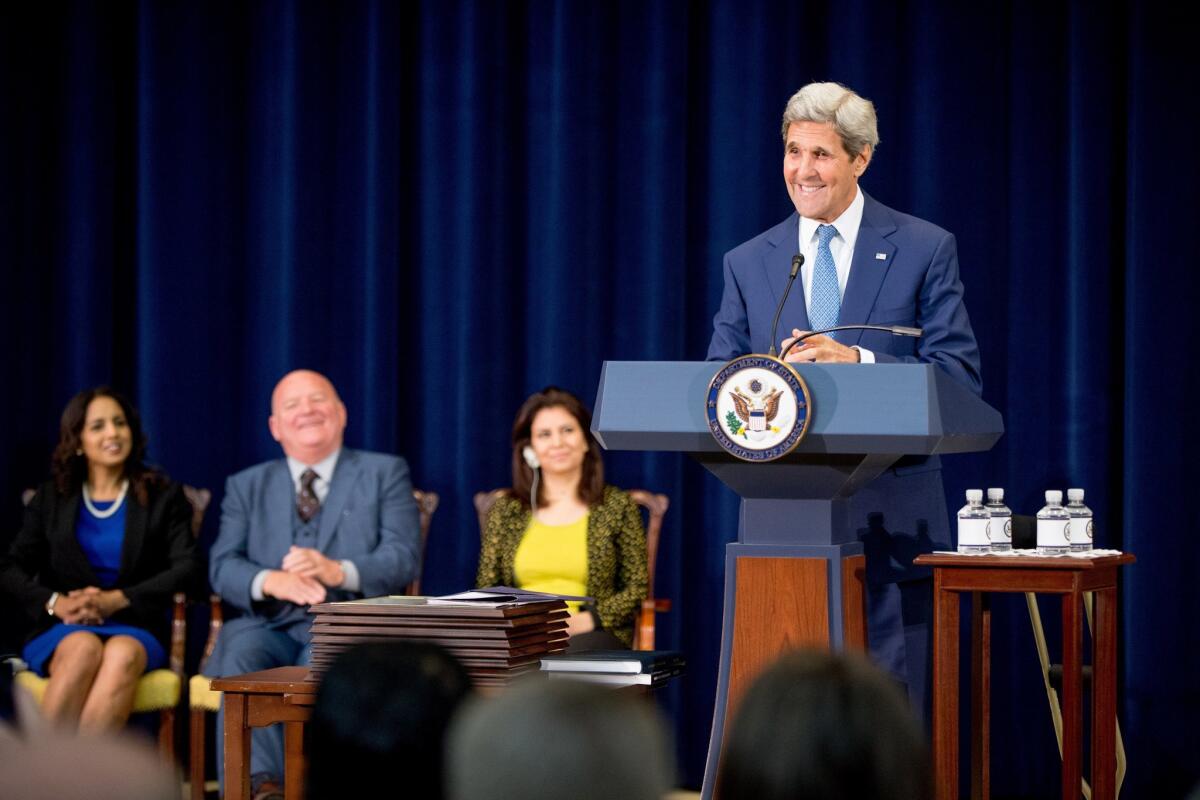Editorial: Malaysia and the cynical politics of free trade

Secretary of State John Kerry, accompanied by “2015 Trafficking in Persons Report heroes,” whose efforts have made an impact on the global fight against modern slavery, speaks during a news conference at the State Department on July 27.
- Share via
When Congress granted President Obama fast-track authority in June to negotiate trade deals, it included an amendment by Sen. Robert Menendez (D-N.J.) barring any nation on the bottom rung of the State Department’s annual Trafficking in Persons report from being part of a trade pact with the United States. Malaysia, one of a dozen member nations in the looming Trans-Pacific Partnership deal, has been on that bottom rung, known as Tier 3, since 2014 because of its persistent failure to take meaningful steps to combat human trafficking.
Yet the 2015 trafficking report released last week miraculously moved Malaysia up a rung, qualifying it for membership in the TPP, even though international human rights observers say they have seen no notable improvements in its lax approach to trafficking. In fact, the U.S. ambassador to Malaysia, Joseph Yun, told attendees at a youth conference on human trafficking in April that Malaysia had to do more if it hoped to be promoted from Tier 3. It was promoted anyway.
Menendez argues that the upgrades of Malaysia and Cuba reflected politics, not improvements in those countries. Sens. Bob Corker (R-Tenn.) and Benjamin L. Cardin (D-Md.), the top-ranked members of the Senate Foreign Relations Committee, have asked Secretary of State John F. Kerry for a briefing on the subject.
The case for keeping Cuba on Tier 3 is less clear than that for Malaysia. In the new report, the State Department describes Malaysia as a destination as well as “a source and transit country” for people “subjected to forced labor and women and children to sex trafficking.” Most of the victims “are among the estimated 2 million documented and more than 2 million undocumented foreign workers in Malaysia.” The department had cited those conditions when it dropped the country to Tier 3.
The new report describes objectionable conditions in Malaysia, including debt bondage, passport confiscations by employers and children forced to work as street beggars. What improvements did the State Department cite? Some proposed (but not passed) amendments to anti-trafficking laws, a small pilot project to give trafficking victims under orders of protection more freedom to move and to work, and a doubling of trafficking investigations — even though convictions fell from nine in 2013 to four in 2014.
Tier 3 status is reserved for countries that neither comply with the minimum standards of the U.S. Trafficking Victims Protection Act nor make “significant efforts to do so.” That defines Malaysia. Kerry is in the country this week, and we hope he at least has the good grace to feel embarrassed over his department’s decision to turn its back on trafficking victims for the sake of bringing a strategically important country into a trade deal.
Follow the Opinion section on Twitter @latimesopinion and Facebook
More to Read
A cure for the common opinion
Get thought-provoking perspectives with our weekly newsletter.
You may occasionally receive promotional content from the Los Angeles Times.









